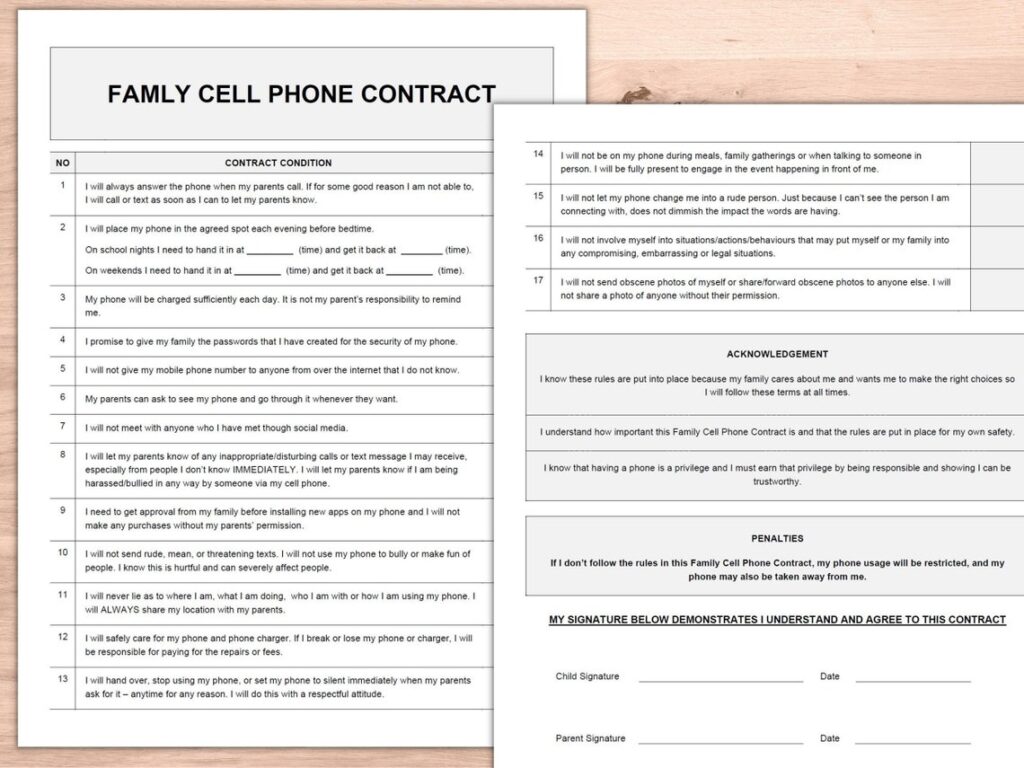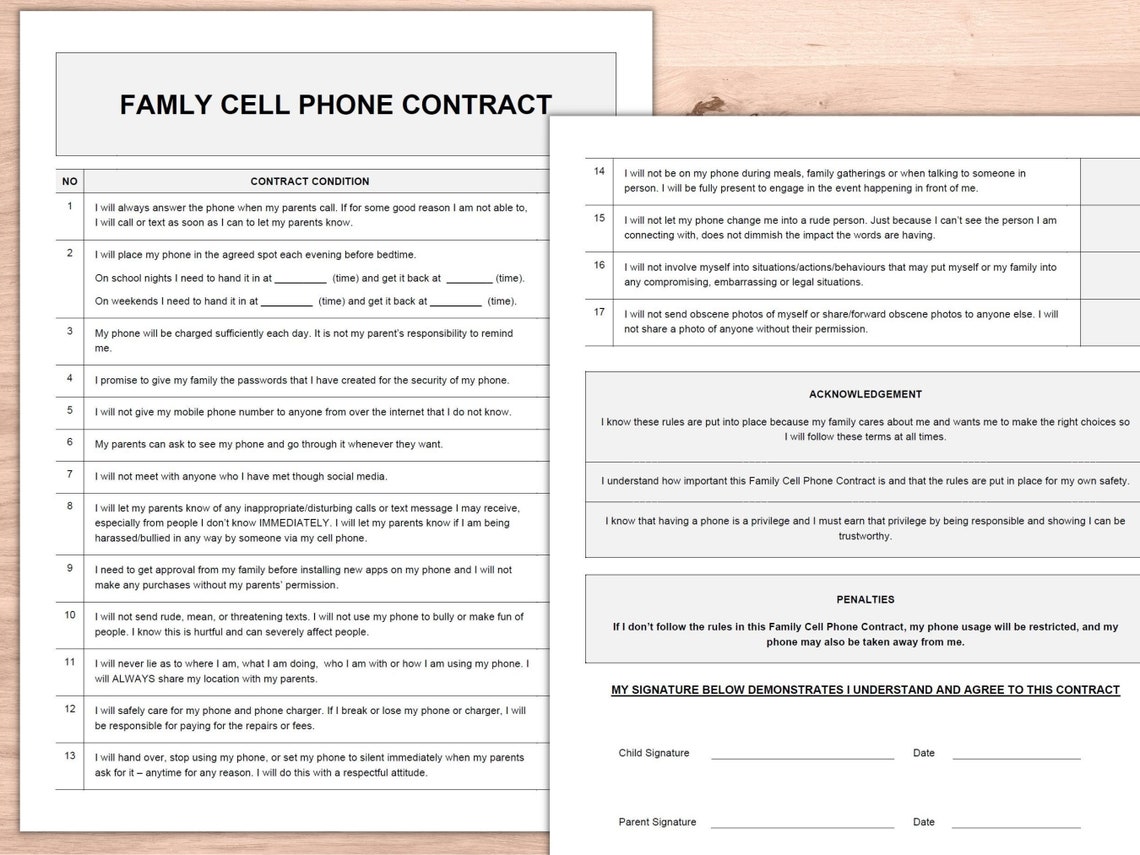
Navigating the Nuances of a Sample Cell Phone Contract: A Comprehensive Guide
In today’s hyper-connected world, a cell phone contract is more than just a piece of paper; it’s a gateway to communication, information, and entertainment. Understanding the intricacies of a sample cell phone contract is crucial before signing on the dotted line. This guide aims to demystify the often complex language and clauses within these agreements, empowering you to make informed decisions and avoid potential pitfalls. Whether you’re a first-time buyer or a seasoned mobile user, this comprehensive overview will equip you with the knowledge to navigate the nuances of a sample cell phone contract with confidence.
Understanding the Basics of a Cell Phone Contract
At its core, a cell phone contract is a legally binding agreement between you (the subscriber) and a mobile carrier (the provider). This contract outlines the terms and conditions of your mobile service, including the duration of the agreement, the services provided, and the associated costs. It’s essential to understand each component before committing to a plan.
Key Components of a Sample Cell Phone Contract
- Contract Term: This specifies the length of the agreement, typically ranging from one to two years.
- Service Plan: Details the amount of data, talk time, and text messages included in your monthly plan.
- Monthly Fee: The recurring charge you’ll pay for the services outlined in the service plan.
- Equipment Charges: If you’re financing a phone through the carrier, this section outlines the monthly payments and any associated interest.
- Early Termination Fee (ETF): A penalty charged if you cancel the contract before the term expires.
- Overages: Charges incurred for exceeding your data, talk time, or text message allowances.
- Roaming Charges: Fees for using your phone outside of your carrier’s network coverage area.
- Taxes and Fees: Additional charges levied by the government or the carrier.
- Terms of Service: A comprehensive document outlining the carrier’s policies regarding service usage, acceptable use, and liability.
Decoding the Fine Print: Key Clauses to Watch Out For
The devil is often in the details, and a sample cell phone contract is no exception. Several key clauses can significantly impact your experience and your wallet. Here are some to pay close attention to:
Automatic Renewal Clauses
Many contracts include automatic renewal clauses, which automatically extend your contract for another term unless you actively cancel it before the expiration date. Be aware of the renewal terms and set reminders to cancel if you don’t want to continue the service.
Arbitration Clauses
Arbitration clauses require you to resolve disputes with the carrier through arbitration rather than through the court system. This can limit your legal options and potentially disadvantage you in case of a dispute.
Limitation of Liability Clauses
These clauses limit the carrier’s liability for service interruptions, data breaches, or other issues. They may prevent you from seeking substantial compensation for damages caused by the carrier’s negligence.
Change of Terms Clauses
Carriers often reserve the right to change the terms of your contract at any time, with or without notice. This can include increasing your monthly fee, reducing your data allowance, or adding new charges. Review your bills carefully for any unexpected changes.
Data Throttling and Prioritization
Some contracts allow carriers to throttle or prioritize data speeds based on factors such as usage or plan type. This can significantly impact your browsing experience, especially during peak hours.
Negotiating Your Cell Phone Contract
While many aspects of a sample cell phone contract are standardized, there’s often room for negotiation. Don’t be afraid to ask for better deals, discounts, or additional features. Here are some tips for negotiating your contract:
- Research Competitor Offers: Compare prices and features from different carriers to leverage your negotiating power.
- Bundle Services: If you bundle your cell phone service with other services like internet or cable, you may be eligible for discounts.
- Negotiate Data Allowances: If you consistently exceed your data allowance, negotiate for a higher data cap or an unlimited plan.
- Ask About Discounts: Inquire about discounts for students, seniors, military personnel, or employees of certain companies.
- Be Polite and Persistent: Remain courteous and professional throughout the negotiation process.
Understanding Early Termination Fees (ETFs)
Early termination fees (ETFs) are penalties charged for canceling your cell phone contract before the term expires. ETFs are designed to recoup the carrier’s investment in subsidizing your phone or providing discounted service. However, ETFs can be substantial, making it costly to switch carriers mid-contract.
Strategies to Avoid ETFs
- Wait Out Your Contract: The simplest way to avoid an ETF is to wait until your contract expires before switching carriers.
- Negotiate a Waiver: In some cases, you may be able to negotiate a waiver of the ETF, especially if you’re experiencing service issues or moving to an area with poor coverage.
- Transfer Your Contract: Some carriers allow you to transfer your contract to another person, avoiding the ETF altogether.
- Check for Loopholes: Review your contract carefully for any loopholes or clauses that may allow you to cancel without penalty.
The Impact of 5G on Cell Phone Contracts
The rollout of 5G technology is transforming the mobile landscape, and it’s also impacting cell phone contracts. 5G offers faster speeds, lower latency, and increased capacity, enabling new applications and services. However, 5G plans often come with higher prices and data caps.
5G Considerations for Your Contract
- Coverage: Ensure that 5G coverage is available in your area before signing up for a 5G plan.
- Data Usage: 5G’s faster speeds can lead to increased data consumption, so choose a plan with a sufficient data allowance.
- Device Compatibility: You’ll need a 5G-compatible device to take advantage of 5G speeds.
- Pricing: Compare 5G plan prices from different carriers to find the best value.
Reading a Sample Cell Phone Contract: A Step-by-Step Guide
Let’s break down how to effectively read a sample cell phone contract, ensuring you don’t miss any crucial details.
Step 1: Identify the Parties Involved
The contract should clearly state the names and addresses of both parties: you (the subscriber) and the mobile carrier.
Step 2: Review the Term of the Agreement
Note the start and end dates of the contract. Pay attention to any automatic renewal clauses.
Step 3: Understand the Service Plan Details
Carefully examine the details of your service plan, including the amount of data, talk time, and text messages included. Also, check for any restrictions or limitations on usage.
Step 4: Scrutinize the Pricing and Fees
Review the monthly fee, equipment charges (if any), taxes, and fees. Be aware of potential overage charges and roaming fees.
Step 5: Examine the Terms of Service
Read the terms of service carefully, paying attention to clauses related to acceptable use, data throttling, arbitration, and limitation of liability.
Step 6: Look for Early Termination Fees
Identify the amount of the ETF and the conditions under which it applies.
Step 7: Seek Clarification
If you have any questions or concerns about the contract, don’t hesitate to ask the carrier for clarification before signing. A reputable carrier will be transparent and willing to address your concerns.
Common Misconceptions About Cell Phone Contracts
There are several common misconceptions surrounding cell phone contracts. Let’s debunk some of them:
- Myth: You can cancel your contract at any time without penalty.
Reality: Early termination fees typically apply if you cancel before the term expires. - Myth: The advertised price is the total price you’ll pay.
Reality: Taxes, fees, and equipment charges can significantly increase your monthly bill. - Myth: Unlimited data plans are truly unlimited.
Reality: Many unlimited plans have data caps or throttling policies that can limit your speeds after a certain amount of usage. - Myth: You’re stuck with your contract, no matter what.
Reality: You may be able to negotiate a waiver of the ETF or transfer your contract to another person.
Legal Recourse: What to Do if You Have a Dispute
If you have a dispute with your carrier regarding your cell phone contract, there are several steps you can take to seek resolution:
- Contact Customer Service: Start by contacting the carrier’s customer service department and explaining your issue.
- File a Complaint: If you’re not satisfied with the customer service response, file a formal complaint with the carrier.
- Contact the FCC: The Federal Communications Commission (FCC) regulates the telecommunications industry and can mediate disputes between consumers and carriers.
- Consult an Attorney: If all else fails, consult with an attorney who specializes in consumer law to explore your legal options.
Conclusion: Empowering Yourself with Knowledge
A sample cell phone contract, while often dense and filled with legal jargon, doesn’t have to be intimidating. By understanding the key components, clauses, and your rights as a consumer, you can navigate these agreements with confidence and make informed decisions. Take the time to read and understand your contract before signing, and don’t hesitate to ask questions or seek clarification. In doing so, you’ll be well-equipped to secure the best possible mobile service plan for your needs and avoid potential pitfalls. Remember, knowledge is power when it comes to sample cell phone contracts and mobile service agreements. [See also: Cell Phone Plan Comparison Guide] [See also: Understanding Data Usage] [See also: Mobile Carrier Reviews]

